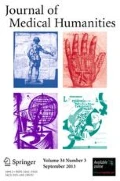In my third year of medical school in Brazil, I decided to study abroad for one year in Canada. In my first semester at the University of Toronto Scarborough, I enrolled in an “Introduction to Health Humanities” course. I was immediately reminded of why I chose medicine: my fascination with the physiological processes of the human body goes hand in hand with my passion for hearing peoples’ stories and understanding the idiosyncrasies that constitute the human essence.
Enrolling in a Canadian baccalaureate course in health humanities as a medical student put me in a unique position among my peers. As a medical student, I have attempted to navigate the treacherous waters of a doctor-patient relationship, feeling orphaned by my lack of formal training in this area. During my medical education, the bulk of what I was taught about how to connect with patients came in the form of offhand advice from professors and clumsy first experiences in a consultation scenario. Being introduced to health humanities in the midst of my medical education was bittersweet; the insights I’ve gained on the human condition would have prepared me much better for the unpredictability of patient encounters, and I am now convinced of the importance of the humanities in pre-medical education.
One of the most telling examples is a patient interaction that happened when I was on call in my home medical school. A woman came in desperately asking for a positive pregnancy test in order to make her eligible for government benefits. I told her she tested negative, to which she lifted her blouse and showed me her lactation. However, her milk was pitch black due to her crack use and her habit of hiding the drug there. At the time I found myself shrouded in a mixture of fear, from never having come across the reality of drug abuse in my hometown and judgment toward her reasons for her desire of motherhood. It wasn’t until my health humanities experience that I was able to write a poem about that encounter, profoundly examining the reality that may have led up to that moment in that woman’s life. Through this artistic examination, I attempted to acknowledge her story and my own and how they came together in that moment.
Observing the healthcare field in which I was immersed, I noticed the unwritten hierarchy that places doctors on the top and patients on the bottom with other healthcare professionals arbitrarily ranked in between. This arrangement showed itself clearly in a clinic where I assisted. I watched as the doctor raised his voice to a patient, vociferating his frustration at the patient’s non-adherence to the treatment. The health humanities showed me how much this behavior belittles and dehumanizes patients, and therefore damages the process of diagnosis, treatment, and healing.
I was disheartened to realize that the health humanities have very little formal tradition in my home country, and I will do everything in my power to bring what I learned back with me. I hope to make some changes to the reality of the health system and the doctor-patient relationships that will surround me for the rest of my life.
Marcela Costa
University of Toronto Scarborough, Study Abroad 2015-16
Medical Student, Federal University of Pernambuco, Recife, Brazil 2019
Author information
Authors and Affiliations
Corresponding author
Rights and permissions
About this article
Cite this article
Costa, M. Perspective. J Med Humanit 38, 487–488 (2017). https://doi.org/10.1007/s10912-017-9460-6
Published:
Issue Date:
DOI: https://doi.org/10.1007/s10912-017-9460-6

